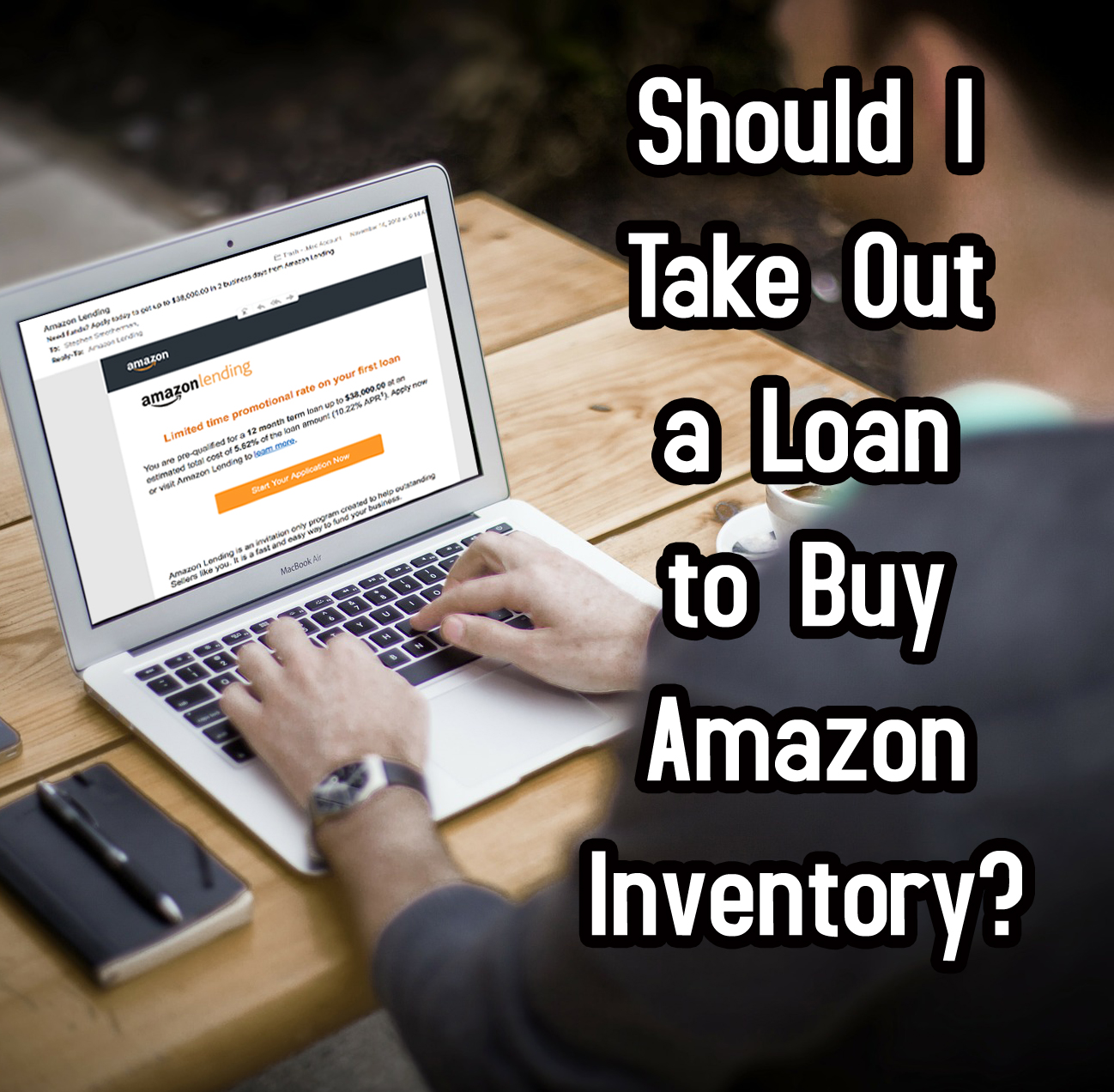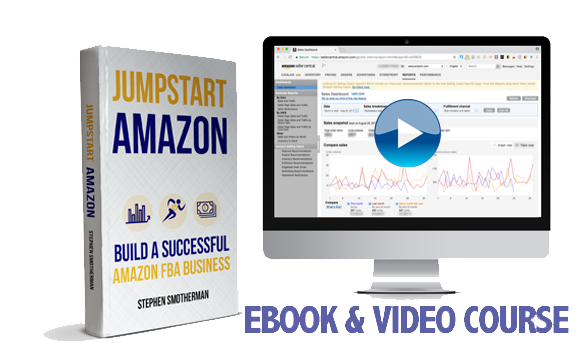The topic of whether or not to take out a loan to buy inventory for your Amazon FBA business is one that comes up pretty regularly, especially for some newer sellers. Discerning if that loan offer is a good idea, from Amazon or any other source, needs some careful consideration, so we’re here to help you make the right choice for your business!
Today’s episode covers four main reasons why we think you should turn down a loan from Amazon, where we investigate the different risky scenarios that could occur, as well as some psychology behind what happens to the human brain when you’re spending other people’s money. We touch on our personal relationship with debt and provide some words of caution on being mindful of how the burden of owing someone else money could put stress on your spouse too. We also let you in on a great hack for buying inventory with a credit card (the right way), plus you’ll hear all about what we believe are the most solid foundations you can use to set your business up for long-term success. This is a conversation you don’t want to miss, so listen today!
Listen on the podcast player below.
Like what you hear? Tell a friend… and be sure to leave us a rating and a review. Here’s how.
Key points from Episode 113:
 Different loan offers you might be thinking about.
Different loan offers you might be thinking about.- Why we’ve recently turned down a $20,000 Amazon loan, and think you should too!
- Some disturbing psychology around borrowing money and bad decision-making.
- Hear some risky scenarios to show that you can’t predict the future.
- How the stress of owing someone else money can negatively impact your home life.
- Thinking about your credit score and the bigger picture.
- What we think are actually the best foundations to grow your business from.
- Covering some of the arguments we hear for this touchy subject.
- The trick to buying inventory on a credit card (the right way).
- And more!
Links and resources mentioned in this episode:
 JumpStart Amazon beginner course
JumpStart Amazon beginner course- Use the code SAVE50 to save $50 off the above course
- Join the Full-Time FBA newsletter
Right-click here and save as to download this episode to your computer.
 More Episodes from the Full-Time FBA Show podcast:
More Episodes from the Full-Time FBA Show podcast:
Don’t miss an upcoming episode! Subscribe, download episodes, and review the Full-Time FBA Show:
-
-
- Subscribe on iTunes
- Follow on Spotify
- Follow on Amazon Music (or just ask Alexa to “play The Full-Time FBA Show podcast”)
- Follow on iHeartRadio
- Subscribe on Podbean
- Subscribe on Podbay
- Subscribe on Podchaser
-
![]()
 JumpStart Amazon
JumpStart Amazon
Build a Successful Amazon FBA Business
By now you know that running a successful Amazon business takes hard work, but you also want to be sure you spend your time focusing on Amazon FBA strategies that are actually proven to provide the results you’re looking for. If you’re ready to finally get serious about your Amazon FBA business, then I invite you to check out JumpStart Amazon: Build a Successful Amazon FBA Business.
JumpStart Amazon is a combination video course and ebook. The ebook is over 220 pages filled with the content and graphics you need to start a successful Amazon business from scratch. The video course features 5 main sections, 19 content-packed modules, and over 40 videos adding up to over 10 and a half hours of video training. This training is set up to help you build a solid foundation and then know how to find growth and success on top of the basics. This course is packed with more results-focused knowledge than any other ebook out there centered around starting an Amazon business. Find out more about JumpStart Amazon today.
![]()
Back to the main page for The Full-Time FBA Show
![]()
Episode 113 Transcript:

[INTRODUCTION]
[0:00:01.8] ANNOUNCER: Welcome to The Full-Time FBA Show. In each episode, it’s our goal to help you turn part-time hours into a full-time income, selling almost anything on Amazon. Now, your hosts of the show, Stephen and Rebecca Smotherman.
[WELCOME]
[0:00:20.8] STEPHEN: Welcome to episode number 113 of The Full-Time FBA show. Today, we are going to be talking about, should I take out a loan for my inventory? To talk about this with me is Rebecca, how are you doing, Rebecca?
[0:00:33.4] REBECCA: Doing great, glad to be here, glad to talk about this topic, it’s one that comes up pretty regularly and I’m glad that we can address it.
[0:00:39.8] STEPHEN: Yeah, let’s get right into that conversation right now.
[CONVERSATION]
[0:00:46.4] REBECCA: Like I said, the topic of whether or not to take out a loan to buy inventory for your Amazon FBA business is one that comes up pretty regularly, especially for some newer sellers and you’re probably – if you’ve been selling on Amazon any amount of time, you might be getting Amazon loan offers. You might be considering the offers that you get in the mail addressed to your business name from your bank, or from other banks, or from credit cards. And you might be wondering, “Should I take out a bank loan, should I get a line of credit? Should I get a small business loan?” Any of these types of things to buy inventory.
There’s loans from services that just particularly focus on resellers, you might have family that you consider getting a loan from. All of these are different options that you might have thought of when you are to the end of your sourcing money for the week or the month and you’re thinking, “If I had more money, I could buy more inventory.”
[0:01:36.0] STEPHEN: Yeah, absolutely. And in fact, a few days ago, we got a loan offer from Amazon asking us if we would like to borrow $20,000 to buy inventory. And we’re just like, “Well, no, that’s not really doing work for us” and that’s kind of what we’re going to be talking about – why that doesn’t work for us and why we think it’s the best decision for you to also turn down loans for your Amazon business.
We got four main reasons we’re going to discuss today, the first reason why we think you should turn down a loan for Amazon inventory is because psychologically it’s been proven, using a loan to buy inventory increases bad buying decisions.
There’s just a psychological thing going on in your brain that when we are dealing with someone else’s money and let’s face it, that’s what a loan is, it’s somebody else’s money. We make worse buying decisions, we take more risks, we are not very careful. And so when we’re dealing with our own money, we make better decisions. We kind of decide to go a little slower and be safer because it’s our hard-earned money and we want to make sure we grow our Amazon business really well. And so, one of the ways that we do that is actually growing slowly, the tortoise beats the hare, slow and steady wins the race. If you’re being impatient and you think a loan will help speed it up, it’s actually going to cause you more mistakes and make bad buying decisions with that money that’s not really yours.
[0:02:56.4] REBECCA: Right, those kinds of decisions might be buying things that are outside of your typical buying parameters, expanding your sales rank perimeters, buying things that might sell for less ROI than you would normally want and the price might not be as stable as you would want but you think, “Oh, if I go ahead and buy it now, I could hopefully capitalize on this.” When you wouldn’t make that type of decision with those parameters if it was money that you had that cash on hand.
[0:03:26.2] STEPHEN: Yup, absolutely.
[0:03:27.1] REBECCA: The second thing that we wanted to mention that is one of the reasons why we do not advocate taking out a loan or using credit to buy inventory is that using credit to buy inventory is just risky, because there’s really no guarantee that your inventory is ever going to sell.
This is the type of decision that you make an inventory buying decision based on, “I think this inventory will sell.” There’s no guarantee that you’re going to get any type of return on the money that you’re investing in inventory. And if you’re using a loan or credit to buy inventory, you’re taking out a loan and telling whoever it is that’s giving you that loan or that credit that you’ll pay that money back based on this inventory selling. And you don’t know that those items that you’re buying won’t become restricted to sell on Amazon at the price that you’re hoping to sell them at.
Then you can’t sell it, you won’t get the money back to pay your loan back. You don’t know that Amazon isn’t going to come in on an item and have a much lower price than you are able to sell it at, and you are stuck with inventory that you can’t sell for the price that you originally were anticipating.
Or even worse, and this I think is probably every seller’s worse nightmare and it’s not super likely to happen but it does happen, it happens. Your account could get suspended and all of your funds that Amazon has for you for sales that you’ve already made could be held for an indefinite amount of time, because your account’s suspended. And you could have that loan or that credit card come due and not be able to pay it back because Amazon won’t disperse your funds to you while your account is suspended.
These are all very risky types of situations that you just don’t want to get into by taking out a loan or running up credit cards to buy inventory. Because you just have no guarantee that your inventory’s going to sell, or that you’re going to get that money dispersed to you in the timeframe that you thought you would from Amazon to be able to pay that back. That’s just a really scary thought to default on a loan or to start racking up interest on a credit card when you just don’t have to do that, if you choose to go a slower pat, a more steady and risk-free path.
[0:05:42.9] STEPHEN: Yeah, definitely.
[0:05:44.2] REBECCA: I guess not risk-free but lower risk.
[0:05:46.4] STEPHEN: Right, because there is risk, I mean, if you’re putting your own money on the line, all those things could happen. But at least you wouldn’t have to worry about debt collectors, or high interest fees or having to owe an amount that’s exponentially more than what you borrowed. Definitely, there’s a risk in all situations but when it comes to borrowing money, that risk is just too high for Amazon sellers in our opinion.
A third reason why that you should pass on signing up for a loan or borrowing money to buy inventory is because, that loan can create stress and anxiety from owing somebody some money. I mean there’s personal stress from trying to make sure that you sell enough so you can pay it back, and that type of stress really begins to add up if you don’t see the results that you were expecting.
You know what? If you’re like, I’m fine with that stress, it’s a risk I’m willing to take, well, what about your spouse, what about anyone that you work with? Are they okay with that? Because from what I know, if one spouse is not too stressed about money, the other one is. That’s usually what happens.
You want to make sure that you are taking your spouse’s anxiety levels into consideration with this. Because here’s the deal, debt disguises itself as freedom but ultimately, it’s a burden, so don’t put that burden on yourself or your spouse.
[0:07:08.1] REBECCA: Yeah, and Stephen says that speaking from experience. One of us in this relationship has more anxiety around money than the other one does. We won’t say who is who but if you’ve read some of our previous books of courses, you probably know that. Okay, I will say it, I’m the one that’s more anxious about money than Stephen is but – we don’t carry debt, and that’s not the only reason why but it is a big factor in it.
We’re both pretty committed to being debt-free but if there was one of us that was willing to take a risk with money, it would be Stephen. And he is very mindful of the fact that I just don’t like to take those kinds of risks. And I think, in any type of partnership, whether it’s your life partnership or business partnership, it’s really good to default to the person who is more risk-averse when it comes to money.
Okay, the fourth reason that we wanted to talk about not taking out loans or running a credit for your business for inventory, is that in certain situations, depending on how you have your business set up and depending on the type of credit we’re talking about, having business debt might actually impact your personal credit score. Which would then impact your ability to get a loan for a house or a car for yourself, for your family in the future.
This is something that you need to think about. This affects not just right now but it could affect you for years to come. There could be potentially long-term years’ worth of consequences in taking out debt and then having it not being able to pay it back as fast as you wanted, or even just taking it out, period. You really need to think about the big picture and how this is going to impact your entire life, credit scores.
I mean, I could go off on how I feel about credit scores but they’re unfair a lot of the time. And you know, that’s just the fact of life and so you just want to make sure that you’re not making decisions for your business that could then impact your family’s ability to get a house or a new car in the future.
[0:09:02.0] STEPHEN: Those are four reasons why we do not suggest that you take a loan from Amazon, from a bank, from even a family member for growing your Amazon business. And I know what some of you are thinking. Some of you are already getting your arguments, your comments ready to leave on our show notes page, it’s easy to think that this is not going to happen to me.
I mean, there’s all these different negative things that could happen. “Well, it’s not going to happen to me.” But the problem is it happens to people every day and we know. We know this is a touchy subject and people can argue about it, but we want to set our listeners up for long-term success. One of the best ways that we can do that is to grow a successful business slowly and with a strong foundation. Building a business on debt is a weak foundation and it is not what we suggest you do.
[0:09:51.4] REBECCA: Yeah, we’ve heard all of the arguments, so if you think that you can explain to us about how you’re leaving money on the table if you don’t leverage debt to make more profits, then you’re wrong. We’ve heard it, I don’t need it explained to me. I understand the principles behind using debt and I love how it’s always leveraging debt. I get it, I understand it. We both know how it works.
We both understand the concept but it’s just risky, and we especially do not think that beginners should even consider taking out any type of debt in order to buy inventory for the reasons that we listed above. We just wanted to share this part of our philosophy with you, and again like Stephen said, you can agree or disagree. You can be tempted to think that, “Oh those are very extreme things that you are talking about that won’t happen to me.”
And sure, it works. Debt works until it doesn’t work. The strategy of leveraging debt to make more profit works until it doesn’t work, and that’s why we just really want to urge you to be cautious because those times when it doesn’t work are really pretty brutal. Now, one thing that we will say, we do use a credit card to buy inventory and the way we use that credit card is to buy inventory and then pay it back every single week.
We do not buy more inventory than we have cash in our checking account, but we use a credit card to buy the inventory and then every week, I go in and I pay that credit card off with our checking account, the money that we have there that we know is there, that we know will be there every week. And we do that in order to get credit card points cashback.
If you have a credit card, an option to get a credit card like that, where you can get a really good percentage back and you know that you can be trusted, you can trust yourself to pay it back, and that you have the ability to pay it back every week. Then I’m not saying never use a credit card. I am just saying this is how we use it, we never would buy more inventory than what we have cash on hand for.
The reason why we do it every week is because I feel like if I wait until the end of the month, it just becomes too burdensome and it’s like the math on it becomes a little bit more difficult for me to manage. I don’t know, there is no reason not to just do it every week and so that’s what we do. We pay it off every week.
We always, that way have in our checking account just about the right amount of money that we actually have for cash on hand and it’s not too far off of what we owe for the credit card and we’re getting the cashback, and adds up with all the other types of cashback that we get from Rakuten and Swag Bucks and things like that. It really does add up. So if there is a way that you can get that type of rewards from a credit card, we think that that’s a great way to get just a little. It just increases your ROI a little bit more and we’re all about doing that.
[0:12:44.7] STEPHEN: Absolutely, so if you’re thinking about how to grow your Amazon business with a strong foundation, we feel like debt, a loan is a faulty foundation. It’s a cracked foundation, it’s a foundation that is not going to support your business in the long term especially for those who are beginners, so what is the answer? That is to make sure that your foundation is solid by growing it with a cash-based type of inventory system.
We have our jumpstart Amazon course that teaches you all the steps to start your Amazon business to grow it the right way to have a foundation that is solid and that will last a long time. If you wanted some more information about our jumpstart Amazon course, you can go to fulltimefba.com/jumpstart to get the course. You can use the coupon code “save50” all one word, “save50” and you can save 50 bucks off the jumpstart Amazon course, and it will help you grow your Amazon business from the beginning towards success.
[CLOSING CONVERSATION]
[0:13:46.8] REBECCA: Well, that’s all we have for you today. Thank you so much for joining us. Again, we think this is a really important topic and we’re glad that you joined us to talk about this today. We want to remind you as always that you can find the show notes for this episode at fulltimefba.com/113 because this is episode number 113. If you go to that link, you’ll be able to find any links that we mentioned in this episode, as well as the transcript. And while you’re there, be sure and subscribe to our newsletter at fulltimefba.com.
We send out a great newsletter every week with tips and advice about how to run your FBA business and we would love for you to join us there and be sure that you’re getting that newsletter every week.
[0:14:27.0] STEPHEN: Next week on the show, we have interviewed three Amazon reselling experts and asked them one question, what are your top two or three Amazon reseller tools that you have used for your success and so you’ll get to hear their answers next week on the show. See you next time on The Full-Time FBA Show.
[OUTRO]
[0:14:46.6] ANNOUNCER: That is all for this episode of The Full-Time FBA Show. So head over to fulltimefba.com/podcast, where you will find the show notes and links from this episode. While you’re there, subscribe to our newsletter where you’ll get several free downloads of our popular and helpful Amazon FBA resources. Now, take action on what you have learned today so you can find success at turning part-time hours into a full-time income with Amazon FBA.
[END]

Leave a Reply